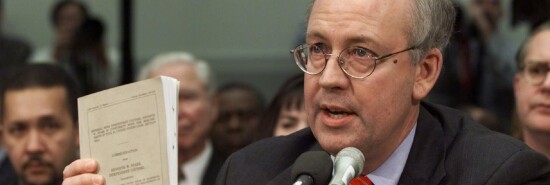
Remember that time Brett Kavanaugh tried to save American politics?
Quin Hillyer
Video Embed
Twenty-five years ago this week, now Supreme Court Justice Brett Kavanaugh had one of his finest moments of wisdom. Alas, his wisdom wasn’t heeded, and American politics has suffered ever since.
In retrospect, the sea-change in politics from mere nastiness to flat-out toxicity was catalyzed by the Lewinsky scandal that almost took down Bill Clinton’s presidency. The fulcrum point in the scandal came Sept. 9 of that year (25 years ago this Saturday), when Independent Counsel Kenneth Starr, for whom Kavanaugh worked, delivered his report on the subject to the House Judiciary Committee.
DEMOCRATIC DEFICITS COULD DOOM US ECONOMY
It already was outrageously tawdry for a president to take advantage of an intern, then lie about it under oath and use government resources to cover it up. It further was inexcusable for his Democratic compatriots to turn the scandal on its head by acting as if its sexual aspect somehow was an excuse and actual defense for perjury and obstruction of justice. (“It’s only sex!”) But the political bloodlust against Clinton by then-Speaker Newt Gingrich made matters worse, as when in the spring of 1998 he said, “I will never again, as long as I am Speaker, make a speech without commenting on this topic.”
In that atmosphere, the wise and sober course of action both for Starr and for House Republicans was to downplay (to whatever extent possible) the more prurient details at issue. Kavanaugh, the youngest key member of Starr’s team, advised that the more prurient material be segregated into a different part of the report. That way, Starr could provide necessary proof and allow key legal aspects of the case to be fully aired, while still giving parents and other more squeamish members of the public a way to filter the extravagantly R-rated materials.
Starr rejected Kavanaugh’s advice. He kept all the details within a single narrative. Kavanaugh then publicly urged the House to “treat as confidential” some of the “information of a personal nature.” Gingrich and the House paid no heed, but instead immediately released the entire report to the public. In Gingrich’s defense, it must be noted that in an earlier incident in the serial Clinton scandals, a House committee had released only excerpts from available materials, actually for non-malicious reasons, and had been publicly excoriated for failing to provide supposedly exculpatory context. (It wasn’t exculpatory at all, but that’s a different subject.) House Republicans thus feared they were damned if they did redact and damned if they didn’t.
Whatever Gingrich’s thought process, the immediate release was a political disaster that solidified the public impression that the Republican agenda was nasty “gotcha” politics rather than a sober attempt to protect the constitutional system. Gingrich further exacerbated the situation by approving a Republican ad campaign heavily stressing the Lewinsky matter more than kitchen-table policy concerns.
The result, from both sides, created a poisonous public square. Politically, many voters otherwise favorably disposed towards Republicans instead saw Republicans as the bad guys befouling the body politic. Widely predicted to gain seats in the House, the GOP instead lost five seats. Gingrich, a transformational figure, was ousted from the speakership. His otherwise excellent would-be replacement, Louisiana’s Bob Livingston, a conservative warrior but also an institutionalist respected and well-liked by most Democrats, was himself felled by reports of long-ago marital failings. Partisan hack Dennis Hastert ascended instead.
Meanwhile, as ace reporter Peter Baker wrote in The Breach, the Democrats’ behavior during the ensuing impeachment imbroglio, while not as self-defeating politically as the GOP’s mistakes, was atrocious. They repeatedly lobbed vicious verbal attacks even at those Republicans who tried to keep a responsible and respectful focus on legal substance. “By aggressively fomenting partisanship for their own purposes,” Baker wrote, accurately, “Democrats polarized the situation in the House so deeply” that they ensured that very few House Republicans would abandon “party solidarity” on anything pertaining to the impeachment proceedings — or, for that matter, on much of anything.
CLICK HERE TO READ MORE FROM THE WASHINGTON EXAMINER
In reality, the Lewinsky matter was part of a much larger pattern of Clinton corruption, and congressional Republicans were indeed defending the rule of law while Democrats flagrantly undermined it. Far too many on both sides, though, descended into gutter politics as a “blood sport,” and bipartisan semi-comity never has recovered.
The whole year of the Lewinsky scandal was awful for the American political system. The bipartisan mishandling of the Starr Report 25 years ago this week turned the awfulness into a near-constant systemic disease. The cure, if there is one, would be a re-adoption of some Kavanaugh-esque restraint.
